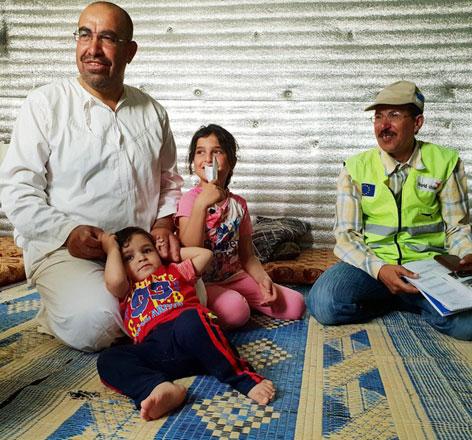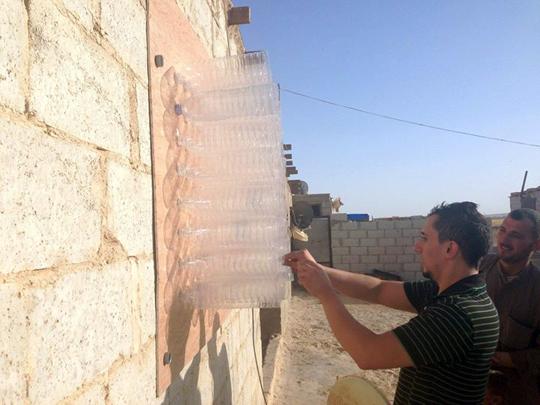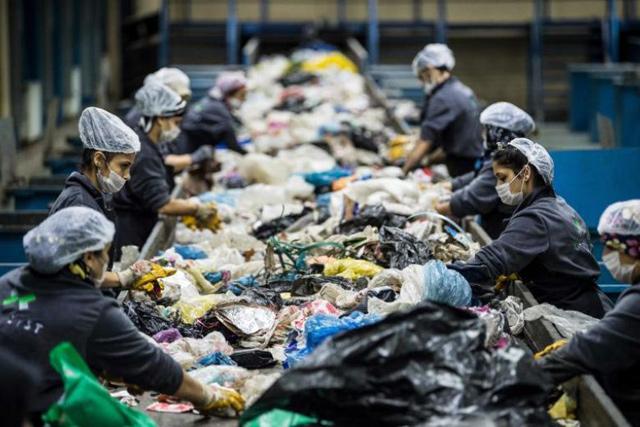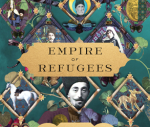You are here
Green Centre beats plastic pollution in Jordan’s desert
By Camille Dupire - Jun 05,2018 - Last updated at Jun 05,2018

Khalid and his children pose for a photo with Mahmoud, one of the community mobiliser volunteers, inside Azraq refugee camp recently (Photo courtesy of World Vision)
AMMAN — A Green Centre in the middle of Jordan's desert is leading the way in the fight against pollution in the Kingdom, with refugees from the Azraq refugee camp working to collect plastics and solid waste, which are recycled into, vegetable containers.
Operated by World Vision International with the support of the European Union, the Green Centre recovers recyclable materials from almost 25 tonnes of solid waste collected daily inside the camp, located some 100km east of Amman.
"We wanted to shed light on this amazing project that tackles solid waste management on the occasion of World Environment Day, which is this year conducted under the theme 'Beat Plastic Pollution'," said Zena Khoury, Syria communications officer at World Vision.
Approximately 31 per cent of the recyclable waste collected every day at the camp are plastics, which constitute one of the greatest threats to the environment, according to experts.
After being sorted, the plastics are sold to processing plants that turn them into vegetable containers, said Dominique Monera-Tabora, behaviour change communications specialist at World Vision, noting that, to date, the Green Centre has accumulated some 26 tonnes of plastic waste that will be sold to recover operational cost.
Alongside the recyclable waste collection, Syrian refugees have also been trained as community mobilisers who seek to raise awareness on recycling among the camp residents.
Through community gatherings and shelter visits, they encourage refugees to separate recyclables from organic waste using colour-coded bins.
“It is important for the camp to have a place to recycle waste and keep the cleanliness,” stressed Mahmoud, a farmer from Homs who said that volunteering with the World Vision’s community mobilisation team also helps in "keeping himself busy from the life he misses back home".
Forty six year old Khalid is also from Homs, where he worked as a businessman before fleeing the war. He said he makes the most of his previous experience owning a big store in Syria to "keep his shelter clean" and ensure his family of seven know how to best use the recycling bin and bag of plastics inside their home.
“Cleanliness is part of our culture and we continue it here, especially after we were given bins for recyclable waste,” he highlighted.
Prior to the establishment of the Green Centre in November 2017, almost 25 tonnes of organic and recyclable waste collected daily were diverted to nearby landfills and dumpsites, contributing to over 2.2 million tonnes of solid municipal waste generated in Jordan each year, according to official figures.
A recent report published by UNESCO during a campaign to reduce plastic use indicated: “Plastic littering also affects agricultural productivity and reduces the quality of livestock. Every year, an estimated 60,000 sheep are suffering weight loss or mortality due to blockage of the digestive system as a result of eating littered plastic bags.”
Plastic bags made of polyethylene and derived from petrol have been denounced as "a worrying environmental hazard" with significant repercussions on agriculture by environmentalists.
On June 3, an article by the BBC reported that a whale found dead off the coast of Thailand had swallowed over 80 plastic bags.
The Sustainable Food Security for refugees through Environmentally Responsible Solid Waste Management Project implemented in Azraq is one of Jordan's responses to an increasingly critical situation in terms of public waste management, Monera-Tabora concluded.
Related Articles
AMMAN — Despite governmental efforts to tackle the Municipal Solid Waste (MSW), most of Jordan’s 2.5 million tonnes of MSW end up at dumpsit
ISTANBUL — Turkish woman Tulay Gercek stands in front of a vending machine at a busy Istanbul metro station but instead of putting coins int
AMMAN — The EU and Germany are launching a new programme to support solid waste management in Zaatari and Azraq refugee camps, as well as in



















